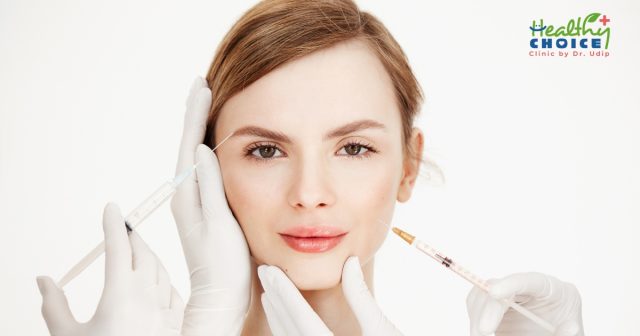
Botulinum toxin injection (trade name- Botox, Dysport, Botulax, Xeomin) is a wrinkle and facial crease treatment that doctors have been using for years. Botox is a brand name for a toxin, called botulinum toxin produced by the Clostridium botulinum bacteria. Other brands, such as Dysport, Botulax, Xeomin, are available. Even though Botox is a toxin, it is beneficial for both cosmetic and medical purposes when used properly and in limited doses by doctors.
HOW IT WORKS
Botox operates by blocking the transmission of nerve impulses to the muscles. The muscle into which it is injected, is made unable to contract. This causes wrinkles to relax and soften. The most popular uses of Botox are to treat frown lines, crow’s feet, and forehead lines.
SCOPE OF TREATMENT
Botox is most often used by physicians to reduce the development of lines on the face. Botox injections can help with a variety of conditions, including:
Crow’s feet: Wrinkles around the eyes
Frown lines: Wrinkles in between the eyebrows, Creases in the forehead and lines at the corners of the mouth, Gummy smile
Hyperhidrosis: Excessive sweating of the underarms, palms and soles
Cervical dystonia: neurological condition that causes extreme muscle spasms in the neck and shoulders.
Blepharospasm: When you can’t stop yourself from blinking
Strabismus: Eyes that are pointing in various directions, Migraine attacks on a regular basis, Overactive bladder
WHAT TO EXPECT AFTER PROCEDURE?
For Botox, there will be no need for anesthesia. Botox is injected with a small needle into specific muscles, causing only minor discomfort. It paralyzes the muscles, but it has no effect on the nerves that trigger sensation or numbness. There will be little or no discomfort with no downtime.
FREQUENCY AND DURATION
Botox injections take just a few minutes. The results normally take 7 to 14 days to completely manifest. It will last up to 3-6 months depending upon the treatment areas.
CONTRAINDICATED MEDICAL CONDITION
Botox should not be used for someone who is pregnant, breastfeeding, or has a neurological disorder. We recommend you to take consultation with doctor first.
FAQS
- What is a Botox Injection?
Botox inhibits muscle contractions by blocking nerve signals. Using a fine needle, Botox is injected into the selected muscle resulting in a relaxation of the muscle and softening the appearance of wrinkles on the surface of skin. - What areas are Botox injections most commonly used on?
Wrinkles surrounding the eyes, known as crow’s feet, frown lines and deep forehead lines are typical areas where people choose to get Botox. Smile creases and lip lines are also common spots where Botox is used. It is also used to control hyperhidrosis (excessive sweating) of armpits and palms. - How do I prepare for a Botox injection?
Before your Botox procedure, you will have a consultation with you doctor outlining how you should prepare for Botox. One week before your procedure, avoid alcohol. Two weeks prior, avoid laser treatment and stop using medications that are anti-inflammatory. - After I get Botox, how long will the effects last?
Botox injections last 4-6 months. After the procedure, muscle movement will slowly return to the treated areas over the coming months. As you receive regular Botox injections, your muscles will be trained to relax more, and the treatment will last a little longer. - What side effects can I expect from Botox?
Injection site bumps like swelling may be seen for few hours. Bruising is a common side effect but will dissipate within a few weeks. Headaches are rare which may last 1-2 days. Some patients experience an eyelid droop which will stop within a few weeks. This occurs as the Botox moves around and gets settled. - Do I need to rest for few days after getting Botox?
You can continue your normal activities immediately after getting Botox. You only need to be mindful of the treated area and refrain from rubbing or touching it for 12 hours. Also, be sure not to lie down within the first 4 hours after the procedure. - Is Botox safe for me?
Botox is FDA approved and safe. But, if you are pregnant, breastfeeding or have a neurological disease, you should not get Botox treatments.

